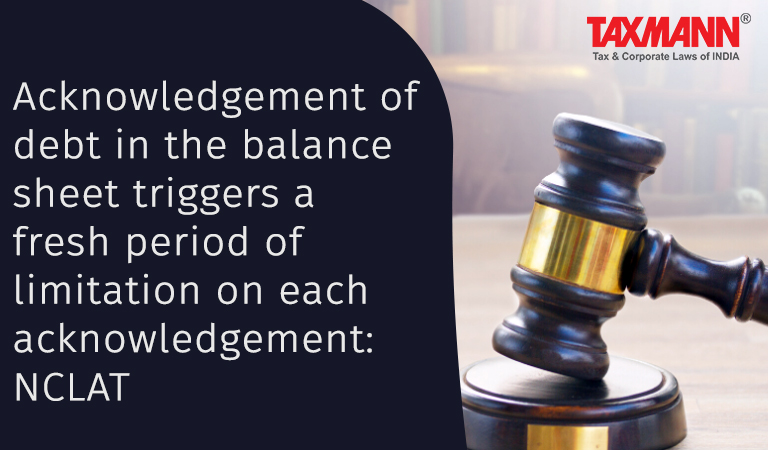Acknowledgement of debt in the balance sheet triggers a fresh period of limitation on each acknowledgement: NCLAT
- Blog|News|Insolvency and Bankruptcy Code|
- 3 Min Read
- By Taxmann
- |
- Last Updated on 10 February, 2022

Case Details: Arrow Engineering Ltd. v. Golden Tobacco Ltd - [2022] 134 taxmann.com 272 (NCL-AT)
Judiciary and Counsel Details
-
- Justice Ashok Bhushan, Chairperson | Jarat Kumar Jain, Judicial Member and Dr. Ashok Kumar Mishra, Technical Member
- Robin Jaisinghani, Vikas Mehta and Rajat Sehgal, Advs. for the Appellant.
- Dhaval Deshpande and Ms. Nidhi Shah, Advs. for the Respondent.
Facts of the Case
In the instant case, the Appellant entered into a Letter of Intent (LoI) for disbursing advance for marketing/financial requirements of a development project to be undertaken by the respondent corporate debtor.
In pursuance of the agreement, the appellant had advanced different amounts to the corporate debtor. The balance sheet of the corporate debtor had acknowledged the receipt of financial assistance of Rs. 40.75 crores, which was duly reflected in the balance sheet. Later, the appellant addressed a letter to the corporate debtor stating that sum of Rs. 41.75 crores had been paid under the Memorandum of Understanding (MoU).
The corporate debtor sent a letter denying signing and executing MoU. It was also alleged that the appellant had failed to raise the required funds as promised. The appellant filed a Commercial Suit for recovery wherein an interim injunction order was issued expressing the opinion that there was a clear admission of liability. Thereafter, an application was filed under section 7 by the appellant claiming as a financial creditor for recovery of the amount of Rs. 41.75 crores together with interest accrued thereon at the rate of 18 per cent.
The Adjudicating Authority rejected an application filed under section 7, holding that arrangement between parties was in nature of business sharing and there was no ‘financial debt’.
The Adjudicating Authority in its judgment observed that in continuation of the Letter of Intent, no MoU was formally executed between the parties. It was held that the arrangement between the parties was in the nature of business sharing and there was no ‘financial debt’. The Adjudicating Authority further held that the claim of the appellant was barred by limitation.
The NCLAT observed that on consideration of documents and correspondences, including balance sheets, it was evident that the amount paid to the corporate debtor as advance for marketing/financial requirements of the development project undertaken by the corporate debtor was nothing but a financial debt within the meaning of IBC. Therefore, the Adjudicating Authority committed an error in holding that appellant was not a financial creditor and rejecting the application filed by the appellant under section 7.
NCLAT Held
The NCLAT further held that where there was an acknowledgement of debt in the balance sheet, there shall be a fresh period of limitation on each acknowledgement, thereby, attracting provisions of section 18 of the Limitation Act, 1963. However, the balance sheet would have to be examined on a case-to-case basis to establish whether acknowledgement of liability in fact had been made.
The NCLAT further stated that where there was an acknowledgement of debt in the balance sheet, there shall be a fresh period of limitation on each acknowledgement, thereby, attracting provisions of section 18 of Limitation Act, 1963 however, balance sheet would have to be examined on a case-to-case basis to establish whether acknowledgement of liability, in fact, had been made.
Case Review
-
- Arrow Engineering Ltd. v. Golden Tobacco Ltd. [2021] 128 taxmann.com 70 (NCLT-Ahd.) (para 25) set aside.
- Asset Reconstruction Co. (India) Ltd. v. Bishal Jaiswal [2021] 126 taxmann.com 200/166 SCL 82 (SC) (para 23) followed.
List of Cases Referred to
-
- Asset Reconstruction Co. (India) Ltd. v. Bishal Jaiswal [2021] 126 taxmann.com 200/166 SCL 82 (SC) (para 23) followed.
- Khan Bahadur Shapoor Fredoom Mazda v. Durga Prosad Chamaria AIR 1961 SC 1236 (para 23).
Disclaimer: The content/information published on the website is only for general information of the user and shall not be construed as legal advice. While the Taxmann has exercised reasonable efforts to ensure the veracity of information/content published, Taxmann shall be under no liability in any manner whatsoever for incorrect information, if any.

Taxmann Publications has a dedicated in-house Research & Editorial Team. This team consists of a team of Chartered Accountants, Company Secretaries, and Lawyers. This team works under the guidance and supervision of editor-in-chief Mr Rakesh Bhargava.
The Research and Editorial Team is responsible for developing reliable and accurate content for the readers. The team follows the six-sigma approach to achieve the benchmark of zero error in its publications and research platforms. The team ensures that the following publication guidelines are thoroughly followed while developing the content:
- The statutory material is obtained only from the authorized and reliable sources
- All the latest developments in the judicial and legislative fields are covered
- Prepare the analytical write-ups on current, controversial, and important issues to help the readers to understand the concept and its implications
- Every content published by Taxmann is complete, accurate and lucid
- All evidence-based statements are supported with proper reference to Section, Circular No., Notification No. or citations
- The golden rules of grammar, style and consistency are thoroughly followed
- Font and size that’s easy to read and remain consistent across all imprint and digital publications are applied



 CA | CS | CMA
CA | CS | CMA
